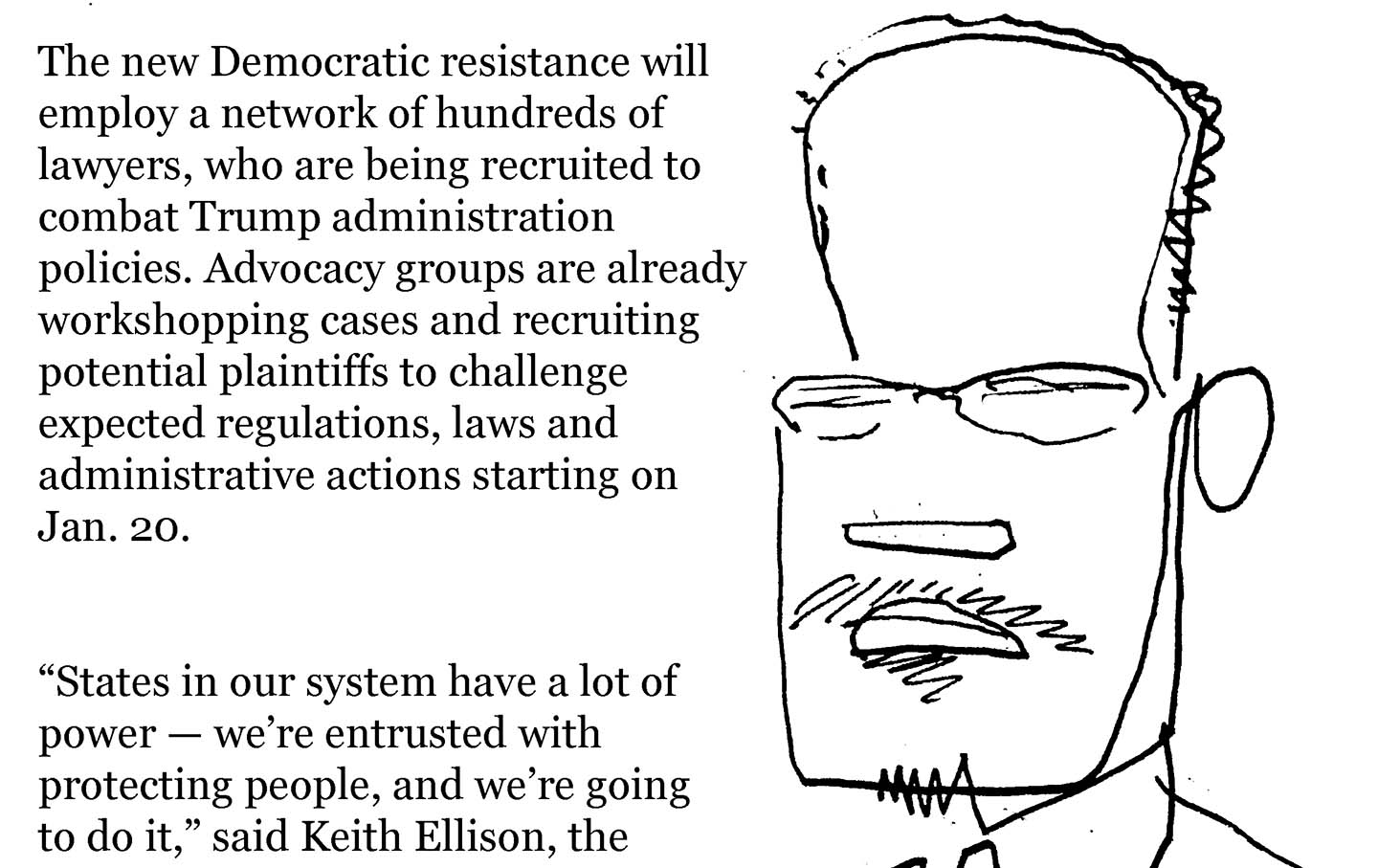Josh Shapiro Is a Bad VP Pick Any Way You Look at It
From Gaza to education to corporate welfare, the Pennsylvania governor would drag Kamala Harris in the wrong direction.
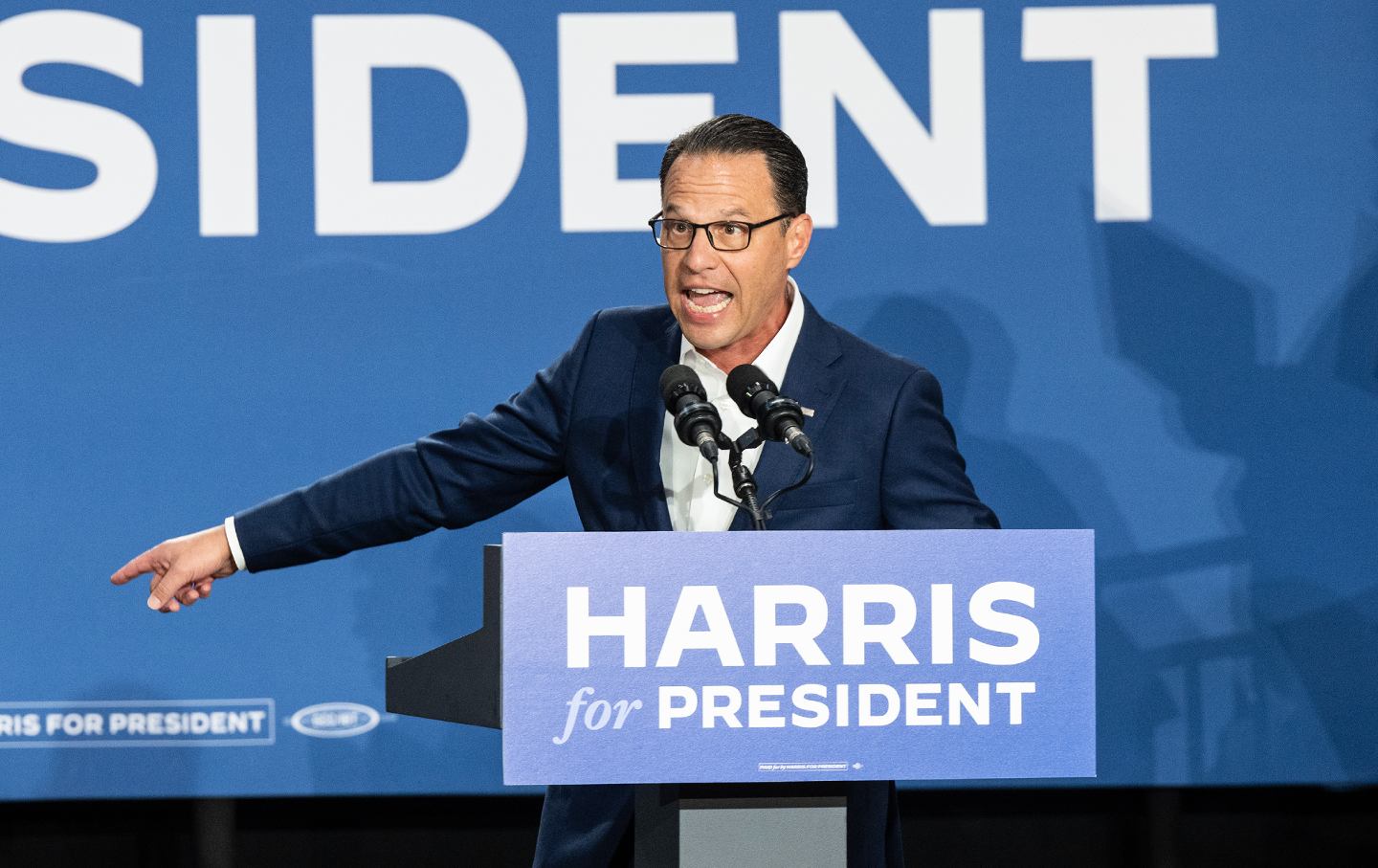
Josh Shapiro rallies for Kamala Harris in Ambler, Pennsylvania, on July 29, 2024.
(Lev Radin / Pacific Press/LightRocket via Getty Images)From the moment that the Kamala Harris campaign announced that she would appear at a rally in Philadelphia alongside her newly anointed vice-presidential pick next Tuesday, pundits and betting markets alike rushed to the surmise that said pick would be Pennsylvania Governor Josh Shapiro.
The Shapiro speculators also got a boost from an Axios report claiming that Harris’s campaign had instructed big-ticket Wall Street donors to kick in their checks now so as to avoid a legal restriction against sitting governors pulling in backsheesh on presidential tickets. Throw in Pennsylvania’s status as a must-win state for Democratic White House aspirants, and Shapiro, the state’s enormously popular governor, looked like a lock as Harris’s running mate.
Yet the Shapiro boosters continue to hew to a strategic playbook that has little relevance to the unprecedented character of both Harris’s candidacy and the impressive surge of Democratic unity behind it.
The strongest argument against picking Shapiro is rooted in his hardline stance against both the Gaza protests on Pennsylvania university campuses—some of which he compared to white supremacist encampments—and the boycott, divestment, and sanctions (BDS) movement seeking to reverse Israel’s brutal human-rights record in the Occupied Territories. In The New Republic, writer David Klion made the case that Shapiro’s elevation to the ticket would kill off much of the movement energy now marshaled behind Harris’s run.
It’s true, of course, that other entrants on Harris’s reported short list, such as Arizona Senator Mark Kelly and Minnesota Governor Tim Walz, have been equivocal-to-hostile to the Gaza protests and the BDS campaign. Atlantic writer Yair Rosenberg has framed the left’s focus on Shapiro as an effort to politicize his Jewish identity in ugly fashion, symbolized by the Twitter hashtag GenocideJosh. But Shapiro has aggressively positioned himself as a leading voice in the sweeping backlash to the Gaza protests, beginning with his demand that Penn University President Liz Magill resign after her testimony before the House’s Education and Workforce Committee’s demagogic, bad-faith hearing on alleged antisemitism on elite college campuses. Shapiro’s statements lend further credence to New York GOP Representative Elise Stefanik’s shameful grandstanding on the issue—cynically directed at private university presidents such as Magill, who weren’t under the same obligations as their state-university counterparts to cite fundamental First Amendment protections against the inquisitions of Stefanik and her committee-chair enabler Virginia Foxx of North Carolina. For anyone concerned with the actual issues at stake in the campus protests, Shapiro’s instant capitulation to the culture-war posturing of Stefanik, Foxx, Joe Wilson, and company is a bright red flag.
The same goes for his enforcement of Pennsylvania’s draconian laws against BDS protests during his tenure as attorney general. Shapiro threatened the ice cream manufacturer Ben and Jerry’s with an injunction to prevent the firm from barring sales to East Jerusalem and other communities in the Occupied Territories. As governor, he’s backed a bill to withdraw state funds from universities considering divestment from Israel. “Because we want to get the money out of the genocide, he’s saying it’s illegal to talk about that,” says David Backer, associate professor of educational policy at West Chester University. “Sorry, that’s a nonstarter. And that is a liability not just for Shapiro but for the Democrats generally.” (Backer stipulates that, like Shapiro, he’s Jewish.)
Shapiro has highlighted his criticisms of Benjamin Netanyahu, whom he called “one of the worst leaders of all time,” who is steering Israel in “the wrong direction.” Yet as is the case with President Joe Biden uncritical endorsement of Israel’s policies, such sideswipes don’t alter the structural and institutional facts on the ground: An elected official determined to enforce financial backing of Israel over the decisions made by corporate and university trustees is plainly an advocate for the status quo in the Middle East.
This having-things-both-ways posture is a clear and troubling weakness of Shapiro’s, as a recent run-in over state school funding showed in stark relief. Last fall, a Pennsylvania court ruled that the unequal learning outcomes embedded in the state public school system rendered it unconstitutional; when state political leaders elected not to appeal the ruling, they created a mandate to vastly expand spending on public education. But during budget negotiations, Shapiro abruptly introduced a major outlay for charter schools—the very institutions that compound educational inequalities while producing no appreciable gains in academic performance. In the run-up to the budget process, Shapiro “was sort of doing this cute dance of trying to court maybe both sides,” recalls Backer, author of a forthcoming book on school funding called As Public As Possible. “And it seems like the school choice thing was another instance of that…. He created a budget with a lot more education funding, but when he was doing his budget negotiations, he was sending these very strong signals that in fact, the way that he was going to fund education and comply with this Supreme Court ruling was to fund vouchers. And so everyone’s jaws dropped to the floor. I mean, to me, it was a complete and utter reversal of the purpose of that ruling, which was 14 years in the making…. Shapiro has been receptive to and supportive of public education, but the indecision and flirtation with school choice is a bright red flag. Because school choice is not freedom. It’s freeloading.”
Ultimately, Backer notes, Shapiro “backed away. So far as I’m aware, he did not move forward with the school choice noises that he was making in the budget that he just passed. He heeded the unions, he responded to that pressure, but he left a lot of us thinking, ‘what are you up to, buddy?’ “
There are plenty of other policy areas where one can pose that same question to Shapiro. Back when he was attorney general, Shapiro staged a long-running feud with Philadelphia’s reformist district attorney Larry Krasner—to the point of instructing his communications team to scold and harangue reporters from The Philadelphia Inquirer who cited evidence of Krasner’s successes on the job. (Shapiro also signed a GOP-led bill last year that would give him the authority to override the DA’s authority and designate a de facto replacement.) As he’s come under consideration by Harris’s team, Shapiro has touted his crusade to institute “aggressive” corporate tax cuts to attract business to the state. Set alongside the donor-driven push to get Harris to ditch the head of the Federal Trade Commission, Lina Khan, for her successful antitrust agenda, Shapiro’s elevation to the ticket would signal Team Harris’s complete retreat from the genuine social democratic economic gains of the Biden White House—a sickeningly familiar, faux-savvy feint from a Democratic Party long in thrall to neoliberal market idolatry. (Indeed, UAW president Shawn Fain, a strong Biden ally and a guest of the president at the last State of the Union address, conspicuously omitted Shapiro from his own list of veep preferences in a recent interview.)
Then there are the accusations that Shapiro has helped to cover up sexual harassment charges in his administration—an especially harmful liability for a candidate sharing a ticket with a female standard-bearer who fought off charges that she’d brokered similar opportunistic payouts during her tenure as California attorney general. Erin McLelland, the Democratic candidate for Pennsylvania state treasurer, recently called out Shapiro for engineering a $295,000 payment stemming from harassment charges against his former legislative liaison Mike Vereb. McLelland called into doubt Shapiro’s ability to “be secure enough to be second under a woman,” given his role in helping “to sweep sexual harassment under the rug.” (Shapiro’s office so far has not replied to requests for comment on the case from the Inquirer and The Daily Beast.) Separately, Shapiro had named Marcel Groen, the disgraced former chairman of the Pennsylvania Democratic Party, who had been forced to resign in 2018 after he didn’t address a welter of #MeToo accusations within the party, to his transition team.
McLelland had also suggested that Shapiro wouldn’t suit the Harris ticket because he was “unlikely to be content to be VP” and would thus “undermine the president to maneuver his own election.” Harsh words, but this reading of Shapiro’s character is widely corroborated in the Pennsylvania political scene. In a recent account of Shapiro’s rise to power, a team of Inquirer reporters underlined the governor’s take-no-prisoners pursuit of high office. Groen was quoted delivering this response to Harris’s victory in his 2011 campaign for the Montgomery County Board of Commissioners: “Watch, he’s going to be president someday.”
Casual followers of Pennsylvania politics may have thought Groen might have been referencing Shapiro’s uncanny mimicry of Barack Obama’s oratory style. But his flashy stump performances mask a deeper Machiavellian streak. In that same Montgomery County race, Shapiro had thrown the incumbent—his former political mentor, onetime US Representative Joe Hoeffel, for whom he’d worked as chief of staff—under the bus, as state party leaders sought to nudge Hoeffel out.
Popular
“swipe left below to view more authors”Swipe →It’s obviously true that any political figure jostling for national recognition suffers from more than a touch of the self-government-through-self-advancement ethos. But once more, Shapiro stands out in the field. As the Inquirer report recounted, former Pennsylvania House speaker Bill DeWeese, who was forced out of office and later jailed on corruption charges, was another early political mentor to Shapiro. As the charges against him became public, DeWeese repeatedly turned to the young representative for legal counsel. Without any advance notice to DeWeese, Shapiro convened a one-man news conference to denounce his erstwhile confidant as “a symbol of a broken system”; he was one of the first state lawmakers to call for DeWeese’s resignation. While the move was no doubt justified—especially on political terms—it nonetheless left a harsh taste in DeWeese’s mouth. “I would never want him in a foxhole with me, and I don’t think the vice president and presidential nominee would want Josh as her wingman,” he told the Inquirer.
Similarly, prior to Pennylsavia’s 2014 gubernatorial race, former US representative Allyson Schwartz, a close political ally of Shapiro’s from Montgomery County, hoped that she could count on his endorsement for the Democratic nomination. Instead, Shapiro endorsed the eventual winner, Tom Wolf, just 10 days ahead of the primary vote. Wolf then promptly anointed Shapiro as his successor—a full two years before Shapiro even announced his gubernatorial run. Leslie Ann Miller, a prominent Democratic fundraiser in Pennsylvania, told the Inquirer that Shapiro has succeeded largely because “he’s created his own safety net”—but the necessary corollary of that strategy has been to kick a large cohort of his former allies out of that net’s cosseting embrace.
Kamala Harris may ultimately succumb to the crackpot realism of conventional political savants and anoint Shapiro as her running mate. But if she does, she should bear in mind that she, more than anybody, understands that loyalty is the signature quality of any potential vice president. And she shouldn’t be surprised, on some future day of reckoning to look up from her foxhole on Pennsylvania Avenue to behold an eloquently empty space.
We cannot back down
We now confront a second Trump presidency.
There’s not a moment to lose. We must harness our fears, our grief, and yes, our anger, to resist the dangerous policies Donald Trump will unleash on our country. We rededicate ourselves to our role as journalists and writers of principle and conscience.
Today, we also steel ourselves for the fight ahead. It will demand a fearless spirit, an informed mind, wise analysis, and humane resistance. We face the enactment of Project 2025, a far-right supreme court, political authoritarianism, increasing inequality and record homelessness, a looming climate crisis, and conflicts abroad. The Nation will expose and propose, nurture investigative reporting, and stand together as a community to keep hope and possibility alive. The Nation’s work will continue—as it has in good and not-so-good times—to develop alternative ideas and visions, to deepen our mission of truth-telling and deep reporting, and to further solidarity in a nation divided.
Armed with a remarkable 160 years of bold, independent journalism, our mandate today remains the same as when abolitionists first founded The Nation—to uphold the principles of democracy and freedom, serve as a beacon through the darkest days of resistance, and to envision and struggle for a brighter future.
The day is dark, the forces arrayed are tenacious, but as the late Nation editorial board member Toni Morrison wrote “No! This is precisely the time when artists go to work. There is no time for despair, no place for self-pity, no need for silence, no room for fear. We speak, we write, we do language. That is how civilizations heal.”
I urge you to stand with The Nation and donate today.
Onwards,
Katrina vanden Heuvel
Editorial Director and Publisher, The Nation
More from The Nation
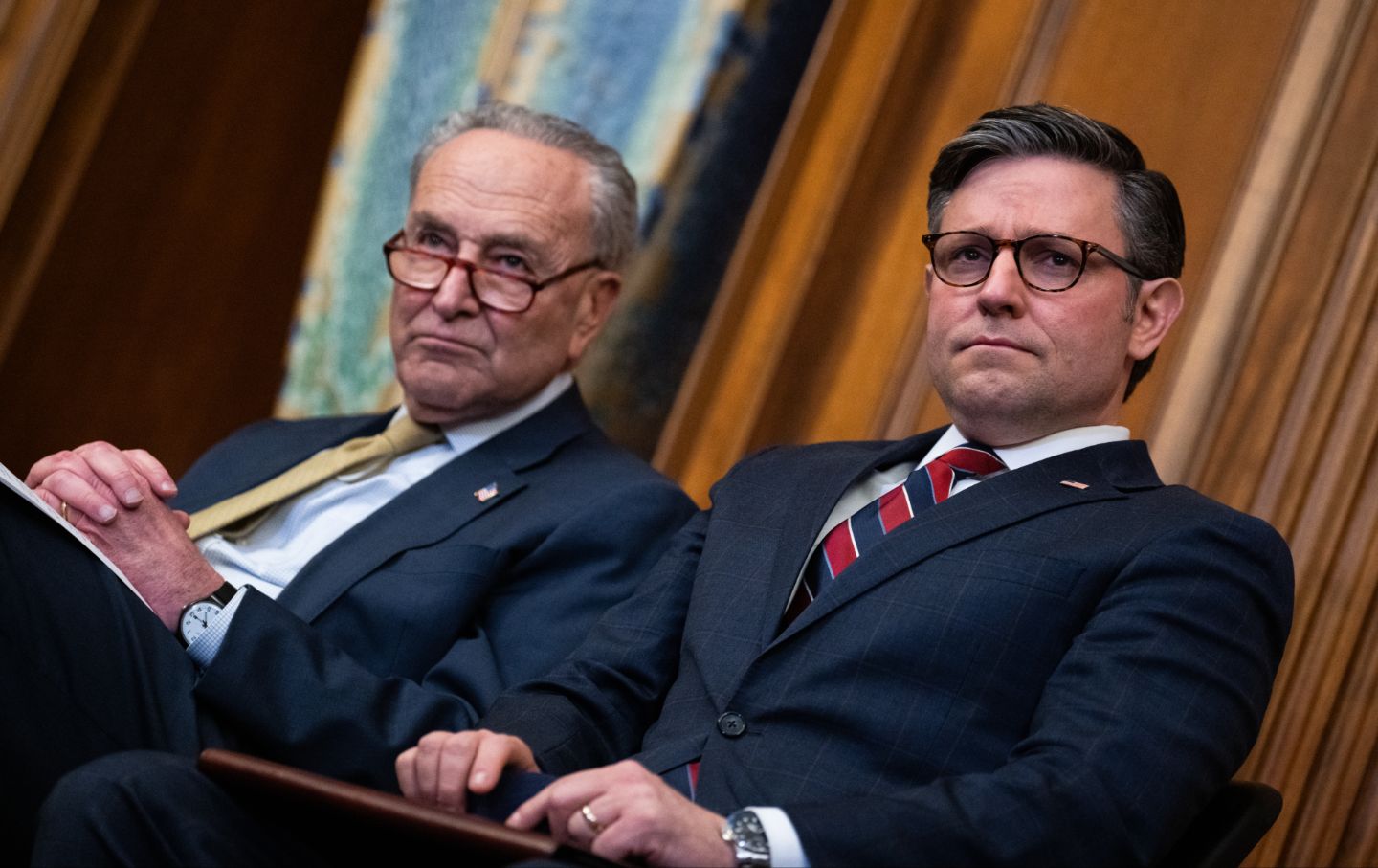
Democrats Must Do Everything They Can to Block the Dangerous Nonprofit Bill Democrats Must Do Everything They Can to Block the Dangerous Nonprofit Bill
The House passed a bill aimed at giving the government sweeping powers to crush nonprofits and attack supporters of Palestine. Democrats need to stand firmly in its way.
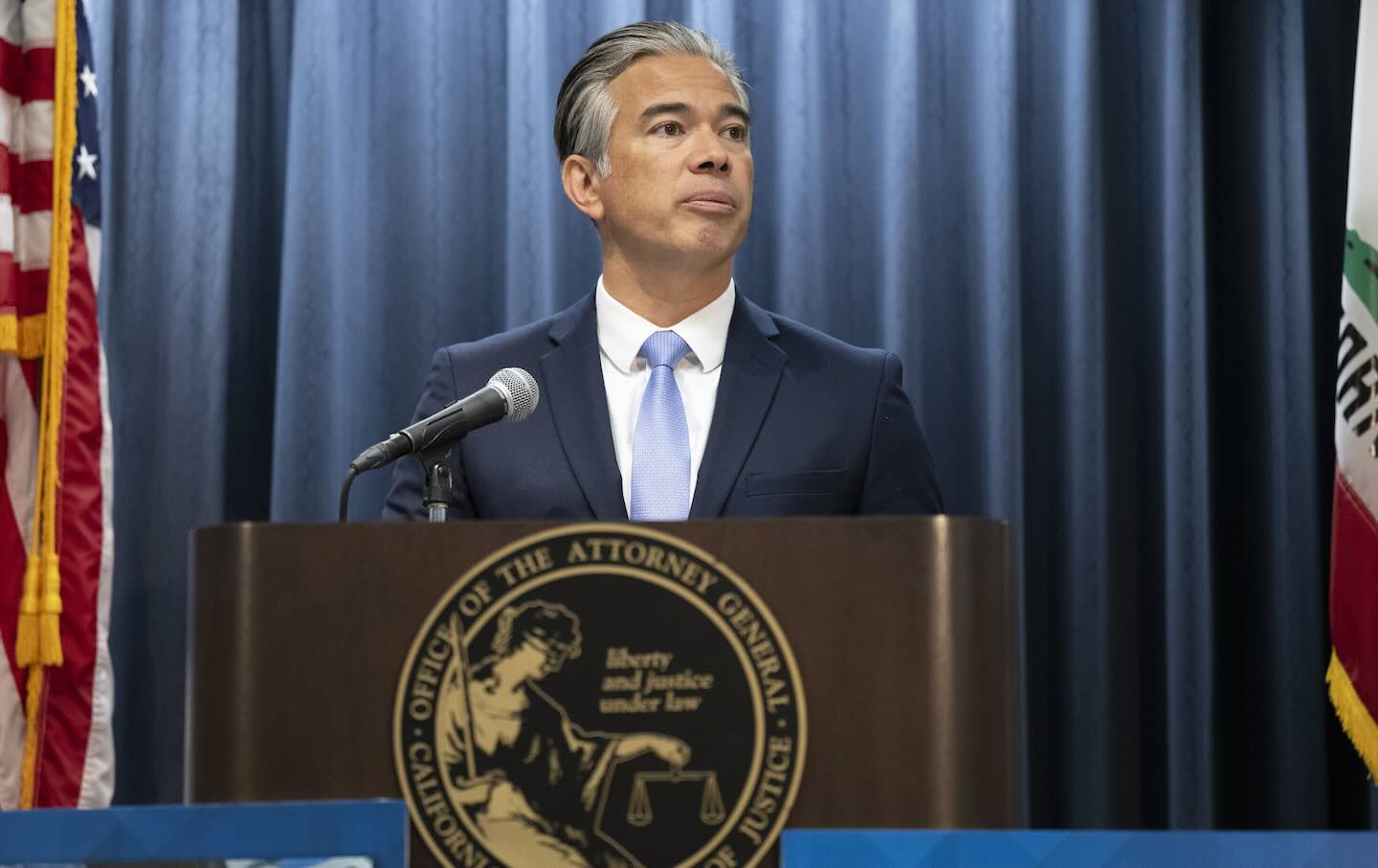
California Is Ready to Go Toe to Toe With Trump 2.0 California Is Ready to Go Toe to Toe With Trump 2.0
“We’ve thought about all the possibilities, and have prepared for every one of them,” said AG Rob Bonta, “and are ready to take action when there’s any unlawful activity.”
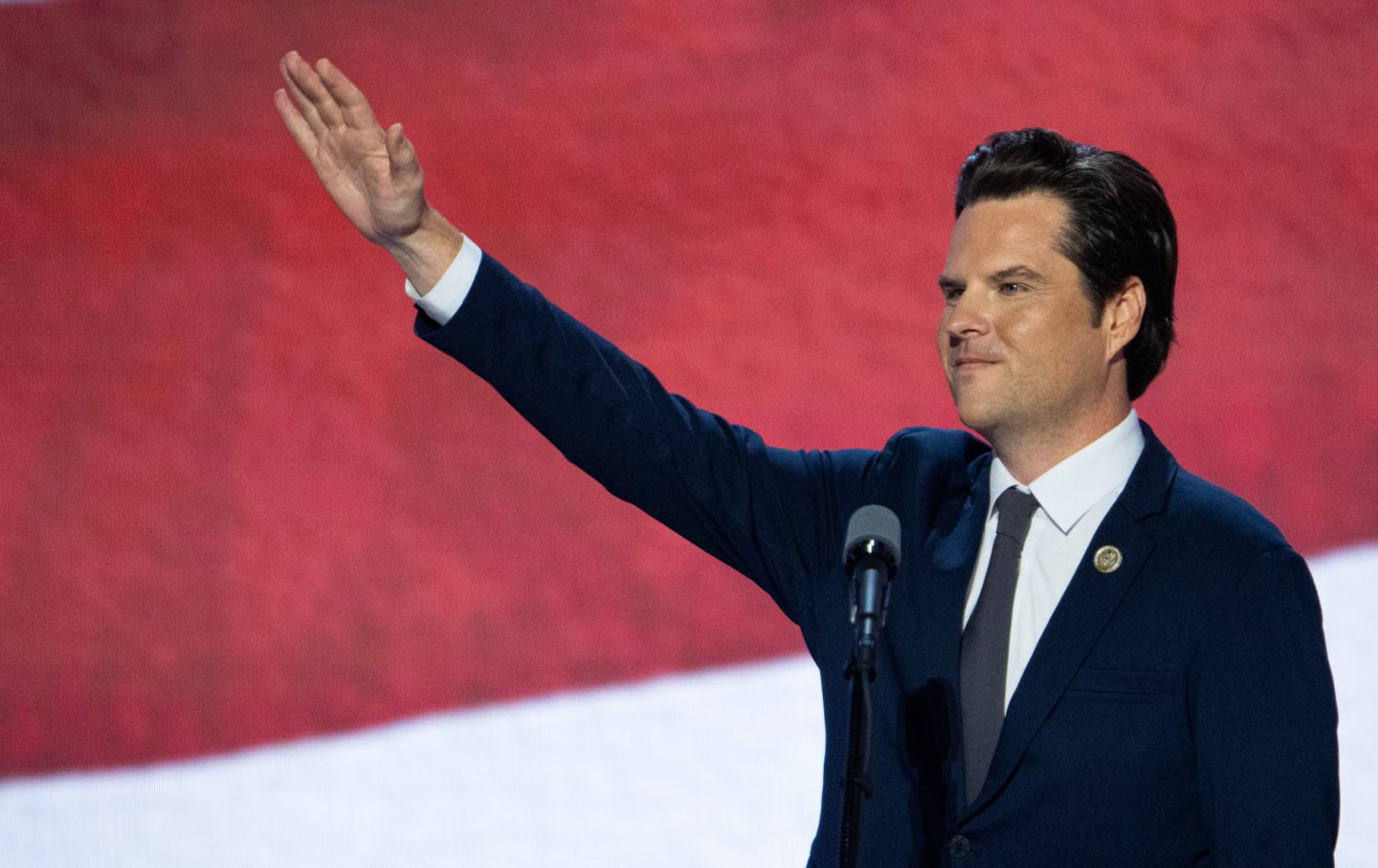
BREAKING: Matt Gaetz Quits, and Journalism Still Matters—a Lot BREAKING: Matt Gaetz Quits, and Journalism Still Matters—a Lot
Forty-five minutes after CNN contacted Trump’s attorney general nominee about additional allegations of sexual misconduct, he was done.

The Red Wave Didn’t Hit Statehouses in This Election The Red Wave Didn’t Hit Statehouses in This Election
State-level Democrats largely held their ground, even scoring key victories in battleground states—and under Trump, that’s going to matter.
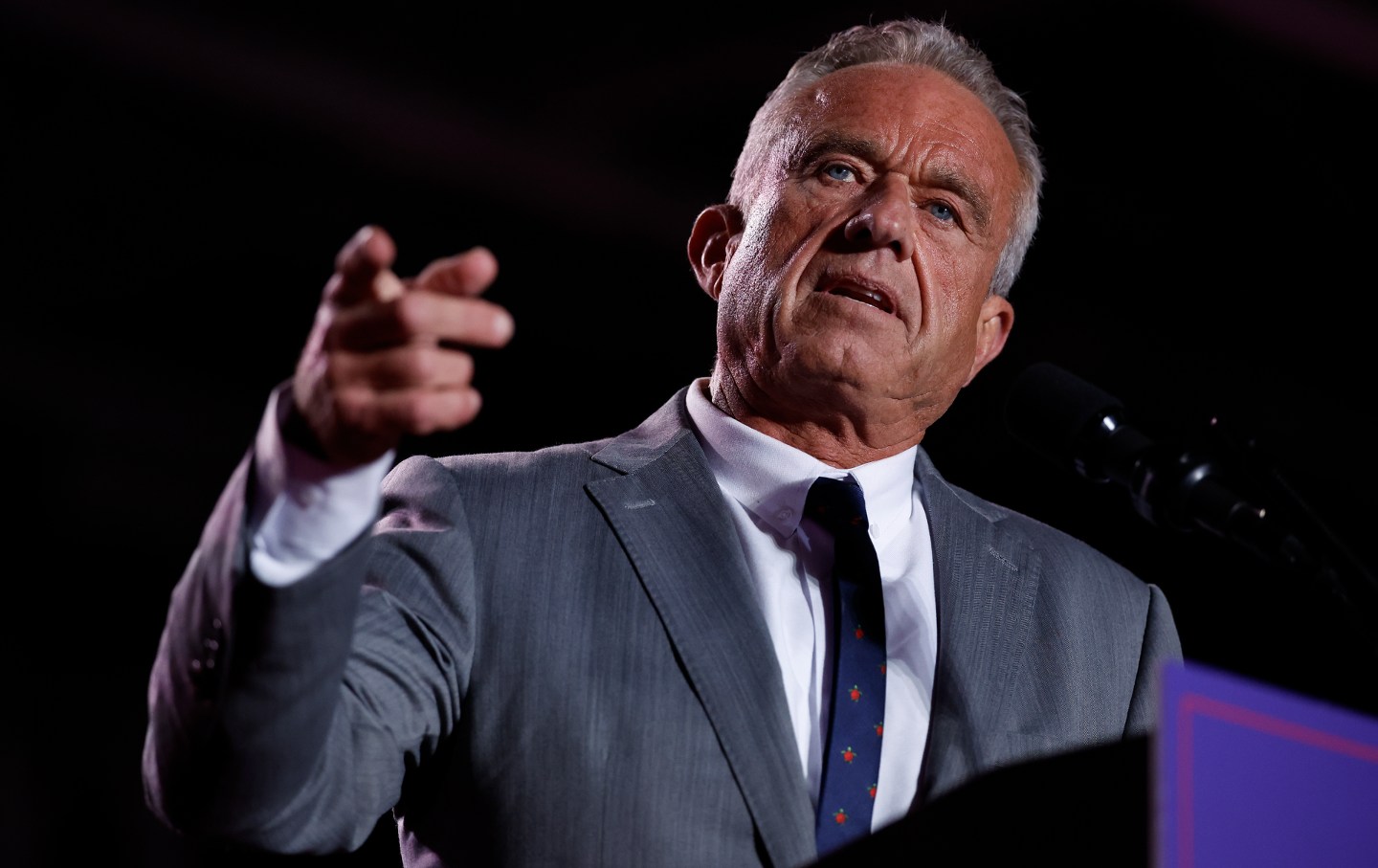
How Nominally Pro-Choice RFK Jr. Can Get Anti-Abortion Groups to Back His HHS Nomination How Nominally Pro-Choice RFK Jr. Can Get Anti-Abortion Groups to Back His HHS Nomination
He can pick a strident abortion opponent like Roger Severino, who wrote the Project 2025 chapter on HHS, as his number two.

